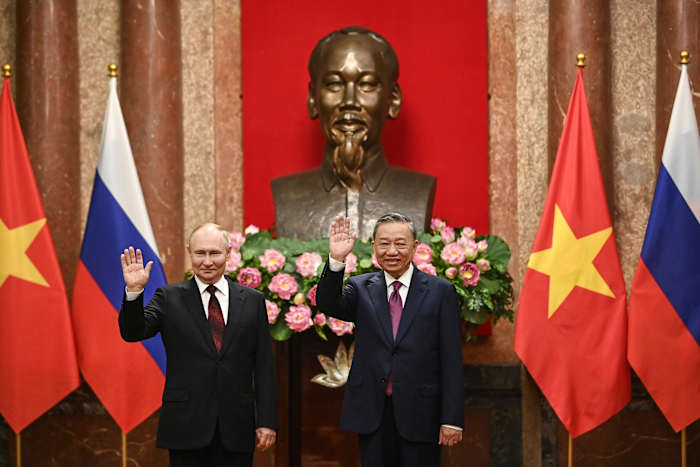Are Russia and Vietnam Dodging US Sanctions with Energy Profits from Arms Deals?

Published: 2025-09-19 00:49:50 | Category: politics diplomacy GNEWS Search
This article delves into the intricate arms deal payment scheme established between Russia and Vietnam, cleverly designed to circumvent Western sanctions. By using profits from joint oil and gas ventures, Vietnam can procure military equipment from Russia without engaging in direct cash transfers, thereby maintaining a level of secrecy in international financial transactions.
Last updated: 30 October 2023 (BST)
Key Takeaways
- Vietnam is using profits from a joint oil venture with Russia to fund military purchases, avoiding sanctions.
- The arrangement allows Vietnam to acquire Russian arms like fighter jets and tanks on credit.
- This back-door payment method circumvents traditional banking channels and the SWIFT network.
- The strategy is significant amid rising tensions between the U.S., Russia, and China.
- Vietnam's military cooperation with Russia continues despite strengthening ties with the U.S.
Understanding the Payment Mechanism
The payment mechanism between Russia and Vietnam operates through an unconventional structure leveraging profits from their joint oil venture, Rusvietpetro. This approach allows Vietnam to maintain a flow of funds for military contracts while staying under the radar of international sanctions.
How the Mechanism Works
According to documents obtained by The Associated Press, the process unfolds as follows:
- Profit Generation: Vietnam generates profits from Rusvietpetro, an oil company operating in Siberia.
- Loan Repayment: These profits first go towards repaying credits extended by Russia for military purchases.
- Fund Transfer: Any remaining profits after repayments are transferred to Zarubezhneft, a Russian state-owned oil company.
- Local Circulation: Zarubezhneft subsequently transfers an equivalent amount back to Vietnam’s oil and gas sector, effectively ensuring the funds circulate within Vietnam and Russia.
This system avoids traditional financial pathways, such as the SWIFT network, which is crucial for most international transactions. By doing so, the countries can sidestep the risks associated with American sanctions.
The Implications of the Arrangement
This back-door strategy is particularly important given the geopolitical landscape. The United States, under various administrations, has sought to impose stricter sanctions on Russia, especially following its invasion of Ukraine. Vietnam's use of this arrangement allows it to continue its military cooperation with Russia while navigating the complexities of international diplomacy.
Geopolitical Context
The backdrop of this arrangement is marked by the evolving relationship between the United States, Vietnam, and China. As Vietnam strengthens its military capabilities to counter potential threats from China, it also seeks to balance its relationships with both the U.S. and Russia.
Vietnam's Military Modernisation
Vietnam has been actively modernising its military, focusing on naval and air power enhancements. This strategic move is largely motivated by territorial disputes in the South China Sea, where confrontations with China have become more frequent.
U.S. and Vietnam Relations
Since the U.S. lifted its arms embargo on Vietnam in 2016, Vietnam has increasingly turned to America for defence supplies. The U.S. sees Vietnam as a crucial ally in its efforts to counterbalance China's growing influence in the region. However, Vietnam's ongoing military dealings with Russia complicate this emerging partnership.
Historical Context of Arms Deals
Vietnam has a long history of military cooperation with Russia, dating back to the Cold War. This relationship has been marked by several significant arms deals, involving substantial credit extensions from Russia to Vietnam for military equipment.
Recent Arms Contracts
Significant contracts include a $2 billion credit deal in 2011 for frigates and tanks, and another $8 billion credit for Sukhoi fighter jets and additional naval vessels in 2023. These deals highlight Vietnam's reliance on Russia for military equipment and spare parts, even as it seeks to diversify its defence partnerships.
Concerns Surrounding Sanctions
The documents obtained by the Associated Press reveal that Vietnam has been cautious about its military transactions with Russia, particularly due to the potential for American sanctions. The concern is that continued arms purchases from Russia could lead to repercussions under the Countering America’s Adversaries Through Sanctions Act (CAATSA).
Navigating Sanction Risks
Experts suggest that Vietnam's current payment mechanism is designed to mitigate the risks of sanctions. By avoiding cross-border transactions, Vietnam aims to shield itself from the threat of secondary sanctions that could target countries engaging in business with Russia's military sector.
The Future of Vietnam-Russia Relations
As tensions between the U.S. and Russia escalate, Vietnam finds itself at a crossroads. While it seeks to strengthen ties with the U.S. as part of its Indo-Pacific strategy, it remains deeply intertwined with Russia through military and economic partnerships.
Strategic Partnerships
In recent years, Vietnam has worked to elevate its relationship with Russia, signing agreements on various fronts, including oil and gas exploration and defence cooperation. These developments suggest that Vietnam is committed to maintaining a robust partnership with Russia, even amidst growing Western pressure.
Potential Consequences
As the geopolitical landscape shifts, Vietnam's ability to balance its relationships with both Russia and the U.S. may be tested. The evolving nature of international sanctions and diplomatic relations could impact Vietnam's military procurement strategies and economic partnerships in the future.
Conclusion
The intricacies of the arms deal payment scheme between Russia and Vietnam represent a significant development in international relations, illustrating how nations can navigate complex geopolitical landscapes. As Vietnam continues to strengthen its military and economic ties with Russia, the implications for U.S.-Vietnam relations and regional stability remain to be seen. How will Vietnam balance its historical ties with Russia against the backdrop of growing U.S. influence in Southeast Asia? The evolving dynamics will be crucial to monitor in the coming years.
#Vietnam #Russia #ArmsDeals
FAQs
What is the payment mechanism used by Vietnam to buy Russian arms?
Vietnam uses profits from its joint oil venture with Russia to repay loans for military purchases, avoiding traditional banking channels and international sanctions.
Why is Vietnam's relationship with Russia significant?
Vietnam has a longstanding military partnership with Russia, relying on it for arms and military equipment, while also seeking to balance ties with the U.S. in a complex geopolitical environment.
What are the risks of U.S. sanctions for Vietnam?
Vietnam faces potential sanctions under the Countering America’s Adversaries Through Sanctions Act (CAATSA) if it continues to engage in arms deals with Russia, especially amid rising geopolitical tensions.
How has the U.S. responded to Vietnam's arms deals with Russia?
The U.S. has expressed concerns about Vietnam's military purchases from Russia but has also recognised Vietnam's strategic importance in countering Chinese influence in the region.
What impact could this arrangement have on future U.S.-Vietnam relations?
The arrangement could complicate U.S.-Vietnam relations, as Vietnam must navigate its ties with Russia while also fostering a strategic partnership with the U.S. in response to regional threats.



